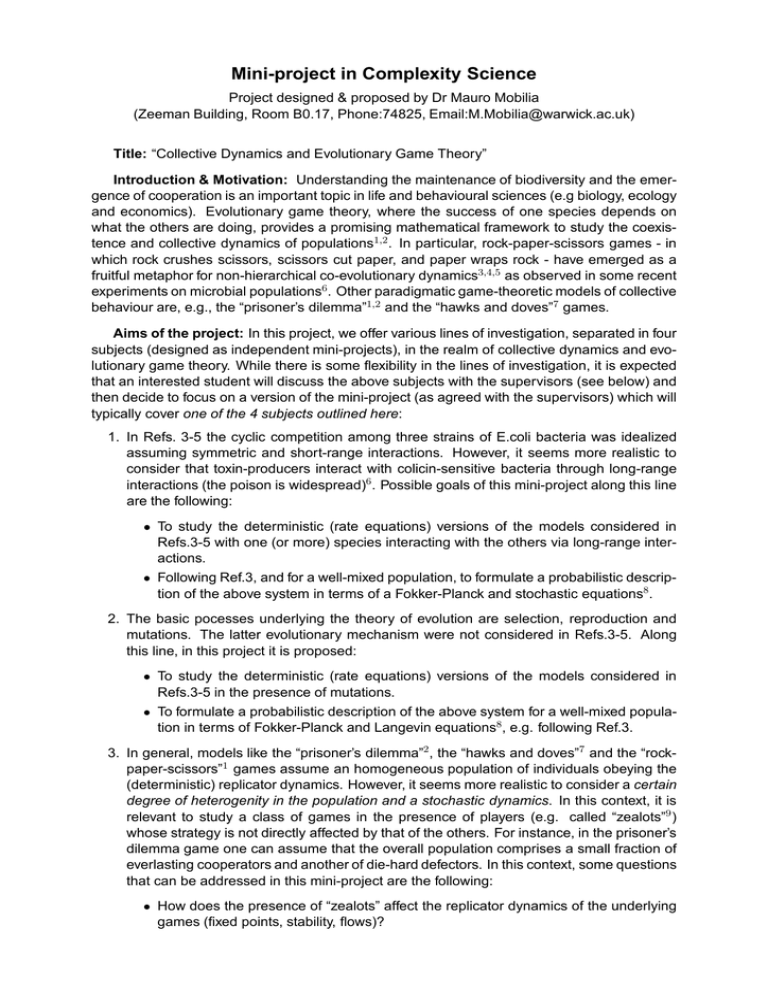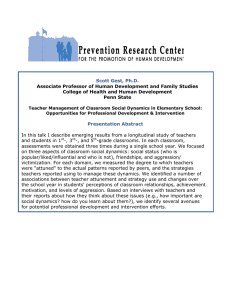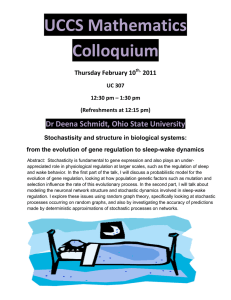Mini-project in Complexity Science
advertisement

Mini-project in Complexity Science Project designed & proposed by Dr Mauro Mobilia (Zeeman Building, Room B0.17, Phone:74825, Email:M.Mobilia@warwick.ac.uk) Title: “Collective Dynamics and Evolutionary Game Theory” Introduction & Motivation: Understanding the maintenance of biodiversity and the emergence of cooperation is an important topic in life and behavioural sciences (e.g biology, ecology and economics). Evolutionary game theory, where the success of one species depends on what the others are doing, provides a promising mathematical framework to study the coexistence and collective dynamics of populations1,2 . In particular, rock-paper-scissors games - in which rock crushes scissors, scissors cut paper, and paper wraps rock - have emerged as a fruitful metaphor for non-hierarchical co-evolutionary dynamics3,4,5 as observed in some recent experiments on microbial populations6. Other paradigmatic game-theoretic models of collective behaviour are, e.g., the “prisoner’s dilemma”1,2 and the “hawks and doves”7 games. Aims of the project: In this project, we offer various lines of investigation, separated in four subjects (designed as independent mini-projects), in the realm of collective dynamics and evolutionary game theory. While there is some flexibility in the lines of investigation, it is expected that an interested student will discuss the above subjects with the supervisors (see below) and then decide to focus on a version of the mini-project (as agreed with the supervisors) which will typically cover one of the 4 subjects outlined here: 1. In Refs. 3-5 the cyclic competition among three strains of E.coli bacteria was idealized assuming symmetric and short-range interactions. However, it seems more realistic to consider that toxin-producers interact with colicin-sensitive bacteria through long-range interactions (the poison is widespread)6. Possible goals of this mini-project along this line are the following: • To study the deterministic (rate equations) versions of the models considered in Refs.3-5 with one (or more) species interacting with the others via long-range interactions. • Following Ref.3, and for a well-mixed population, to formulate a probabilistic description of the above system in terms of a Fokker-Planck and stochastic equations8. 2. The basic pocesses underlying the theory of evolution are selection, reproduction and mutations. The latter evolutionary mechanism were not considered in Refs.3-5. Along this line, in this project it is proposed: • To study the deterministic (rate equations) versions of the models considered in Refs.3-5 in the presence of mutations. • To formulate a probabilistic description of the above system for a well-mixed population in terms of Fokker-Planck and Langevin equations8, e.g. following Ref.3. 3. In general, models like the “prisoner’s dilemma”2 , the “hawks and doves”7 and the “rockpaper-scissors”1 games assume an homogeneous population of individuals obeying the (deterministic) replicator dynamics. However, it seems more realistic to consider a certain degree of heterogenity in the population and a stochastic dynamics. In this context, it is relevant to study a class of games in the presence of players (e.g. called “zealots”9 ) whose strategy is not directly affected by that of the others. For instance, in the prisoner’s dilemma game one can assume that the overall population comprises a small fraction of everlasting cooperators and another of die-hard defectors. In this context, some questions that can be addressed in this mini-project are the following: • How does the presence of “zealots” affect the replicator dynamics of the underlying games (fixed points, stability, flows)? • Following Ref.10, and for a well-mixed population, to devise a probablistic description of the heterogenous games. 4. The rock-paper-scissors game can exhibit different kinds of dynamics which were not all fully covered in Refs.3-5. Possible lines of investigation for this mini-project are therefore: • To study in detail the various scenarios for deterministic replicator dynamics of the rock-paper-scissors game: When is there a globally/marginally stable interior fixed point? When do we obtain heteroclinic cycles? [See, e.g., Chaps. 5 & 7 of Ref.1] • To formulate a probabilistic description of the above system in terms Markovian processes8 , e.g. following Ref.3: How do the stochastic fluctuations affect the deterministic scenarios? This programme will allow the student to become acquainted with some basic concepts of evolutionary game theory (payoff, fitness, replicator dynamics) and nonlinear dynamics (stability criteria, normal form, limit and heteroclinic cycles). The student will also become familiar with the probabilistic formulation of a broad range of problems (master equation, finite-size expansions, Fokker-Planck equations, first-passage problems, stochastic differential equations) and will be able to give a multidisciplinary interpretation of the models studied. Possible developments: This project can serve as starting point for various further developments, such as • To investigate the influence of spatial degrees of freedom • To study the joint effect of internal noise and spatial dispersal (pattern formation) • To study the co-evolutionary dynamics on complex structures (graphs) References: 1. J. Hofbauer and K. Sigmund, Evolutionary Games and Population Dynamics. 2. M. A. Nowak, Evolutionary Dynamics (Belknap Press, Cambridge, 2006). 3. T. Reichenbach, M. Mobilia and E. Frey, Physical Review E 74, 051907 (2006). 4. T. Reichenbach, M. Mobilia and E. Frey, Nature 448, 1046 (2007). 5. T. Reichenbach, M. Mobilia and E. Frey, Physical Review Letters 99, 238105 (2007). 6. B. Kerr et al., Nature 418, 171 (2002). 7. J. Maynard Smith, Evolution and the Theory of Games (Cambridge University Press, 1982). 8. C. W. Gardiner, Handbook of Stochastic Methods (Springer, Berlin, 1983). 9. M. Mobilia, Physical Review Letters 91, 028701 (2003). 10. M. Mobilia, A. Petersen and S. Redner, Journal of Statistical Mechanics: Theory and Experiment, P08029 (2007). Supervision: This project and lines of investigation have been proposed and will be supervised by Dr Mauro Mobilia (Email: M.Mobilia@warwick.ac.uk, phone: 74825). Professor Robert MacKay (Email: R.S.MacKay@warwick.ac.uk, phone: 22218) will serve as a co-supervior of the mini-project. The supervisors have an extensive research and teaching experience in the realm of stochastic and nonlinear dynamics and of their multidisciplinary applications.

